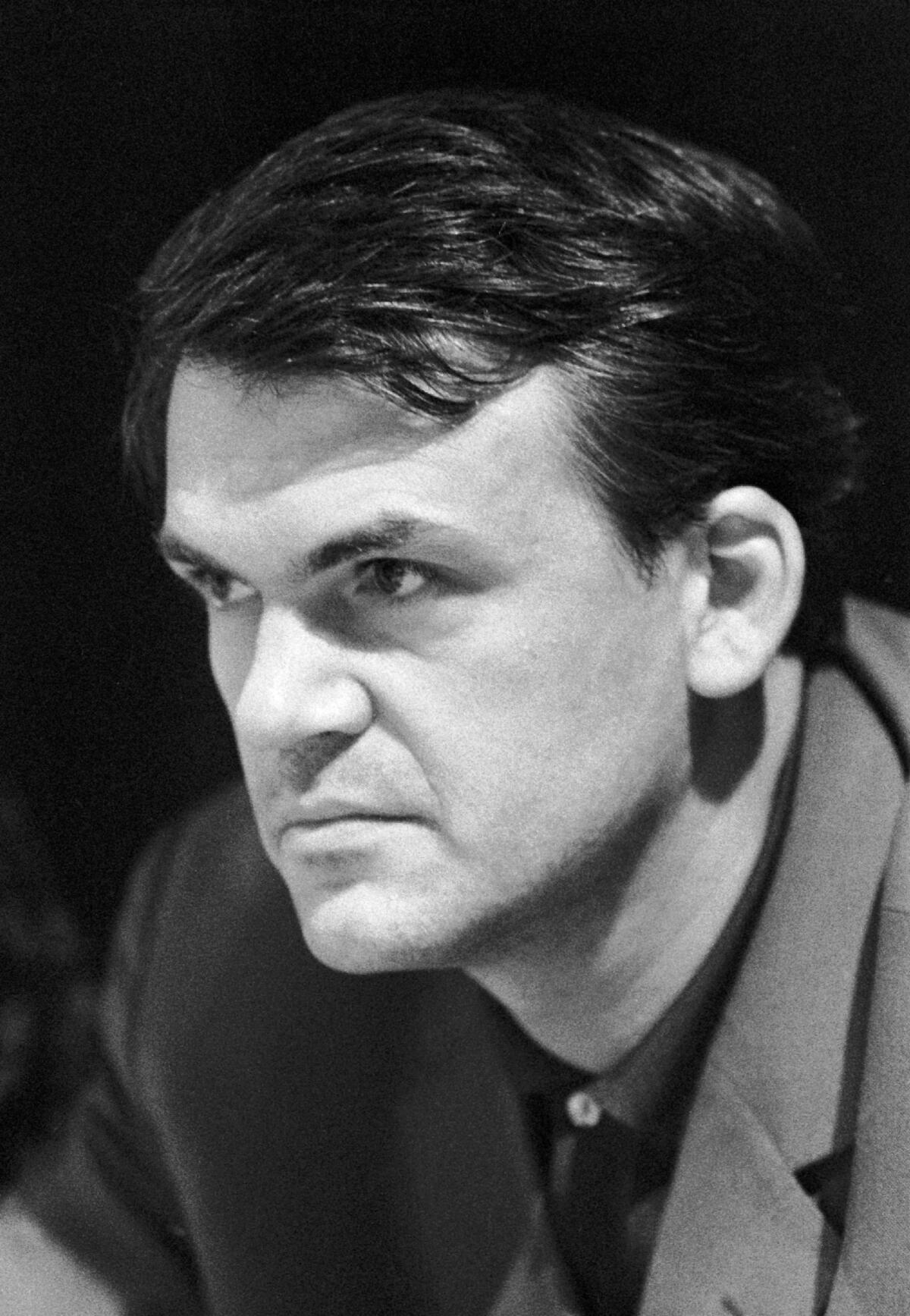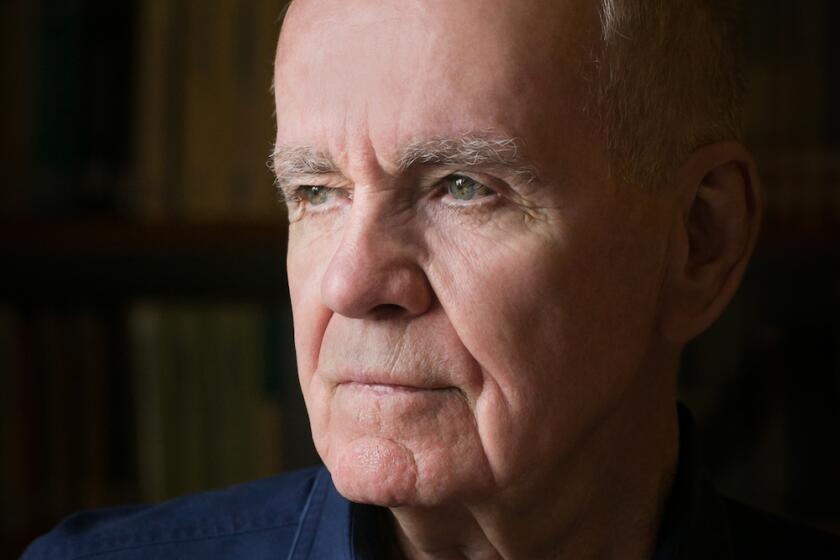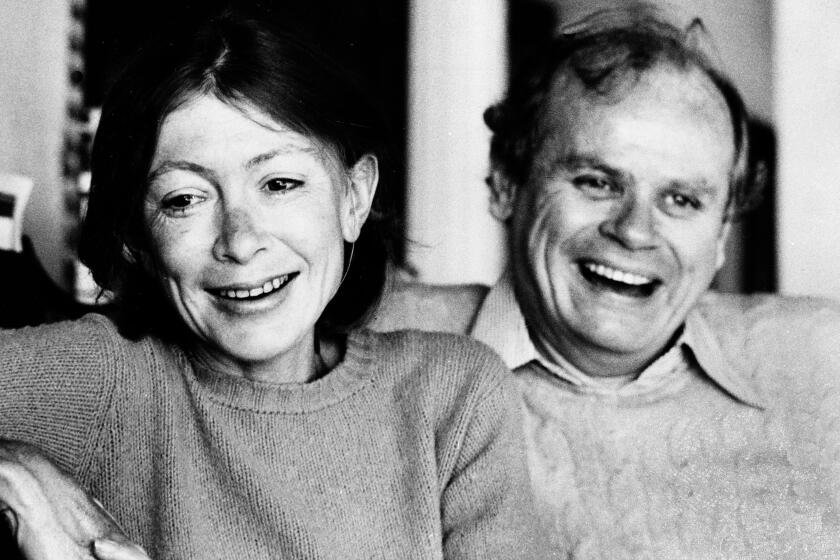Appreciation: In a world full of lies, Milan Kundera taught us how to be free

- Share via
During the late 1980s, when I was still living in New York, I used to pal around with a group of writers known as the Unbearables. The name came from a story one member had written, riffing on the title of Milan Kundera’s 1984 novel “The Unbearable Lightness of Being.” This is not to say that Kundera, the Czech novelist and essayist who died on Tuesday in Paris at the age of 94, was a particular influence on our collective — although I, for one, was a devoted reader — but rather to illustrate the position he held at the time in the constellation of literature.
In short, Kundera was everywhere. His 1979 novel, “The Book of Laughter and Forgetting,” had been reviewed by John Updike in the New York Times Book Review, accompanied by an interview with Philip Roth. “The Unbearable Lightness of Being” had been adapted for the screen by Philip Kaufman, with Lena Olin, Daniel Day-Lewis and Juliette Binoche. Both books, in conjunction with Kundera’s other work, challenged preconceptions about the novel, interweaving asides and digressions, philosophy and autobiography. “A novel,” he told Roth, “is a long piece of synthetic prose based on play with invented characters. These are the only limits.”
For the record:
7:33 a.m. July 14, 2023An earlier version of this piece mistakenly included Uma Thurman in the cast of the film “The Unbearable Lightness of Being.”
Czech author Milan Kundera, known for novels ‘The Unbearable Lightness of Being,’ ‘Identity’ and ‘The Festival of Insignificance,’ has died. He was 94.
Let’s stick with that definition for a moment because it’s so revealing, especially the phrase “based on play.” Once a jazz pianist — this became a source of income after Kundera was expelled from the Czech Communist Party in 1970 and stripped of his job teaching at Prague’s Academy of Fine Arts — he had an intuitive understanding of improvisation, which was a driver of his fiction. He also recognized the subversive power of humor not only to critique but also to undermine totalitarian regimes.
His first novel, “The Joke” — published in 1967 during a period of loosening that culminated with the short-lived Prague Spring — represents a vivid case in point. Taking place in the 1950s, it features a character named Ludwik, who sends a satirical postcard to a woman: “Optimism is the opium of the people!” it announces. “A healthy atmosphere stinks of stupidity! Long live Trotsky!” The joke (or one of them, at any rate) is that the authorities can’t see the humor for what it is.
For Kundera, the book was unexpectedly prescient. After the Soviets put an end to the Prague Spring, “The Joke” was banned as antisocialist. This set in motion the events that led to his eventual decision, in 1975, to go into exile, first in Rennes, France, and then in Paris. His Czech citizenship was revoked in 1979, and not reinstated for 40 years.
Humor was only one of the weapons in Kundera’s literary arsenal; he was particularly adept at using sexual politics as a lens through which to challenge the hypocrisies of the state. In “The Unbearable Lightness of Being,” a surgeon named Tomas becomes a window washer after speaking out against the government and has a number of assignations, which the author uses as a metaphor of sorts for the dynamics of authoritarian power. Even the structure of his novels — “The Book of Laughter and Forgetting,” for instance, unfolds in seven largely disconnected sections — functions as a critique of official narrative, operating in a landscape where truth is a matter of opinion if it is anything at all. “What seemed to be political fanaticism,” he writes there, “was only an excuse, a parable, a manifesto of fidelity, a coded plaint of love.”
John Wray, most recently the author of “Gone to the Wolves,” owes his success as a writer to Cormac McCarthy, who died last week at 89.
Here is the reason Kundera became so visible once his work was readily available in the West: Many of us, myself included, had never seen anything like it before. He blurred the lines between politics and eros, mind and body; each book, it seemed, exploded a different set of hierarchies. The effect was dizzying, exhilarating. It made me want to read and write in unimagined ways.
In that sense, he revolutionized us all.
That’s not to say there weren’t issues. In 2008, Kundera was accused by a Czech publication of having denounced a defector while a student in 1950; he denied the claim. The erotic aspect of his work often exposed a discomforting misogyny. At the same time, I want to argue, his essential message — his legacy, if you will — was one of liberation, in terms of form and style as much as sex or politics.
“I often hear it said,” he wrote in 1985, “that the novel has exhausted all its possibilities. I have the opposite impression: during its 400-year history, the novel has missed many of its possibilities; it has left many great opportunities unexplored, many paths forgotten, calls unheard.” He was critiquing naturalism; instead, he wanted to frame a counter-history, to move beyond the realistic fiction of Samuel Richardson or Dostoevsky toward the more amorphous whimsy of Denis Diderot or Laurence Sterne, whose 18th century mashup “Tristram Shandy” Kundera admired, characterizing it — approvingly — as “unserious throughout.”
By calling such a book unserious, Kundera was actually saying just the opposite. He was arguing in favor of its openness, its refusal to traffic in standard pieties. “It does not,” he elaborated, “make us believe in anything: not in the truth of its characters, nor in the truth of its author, nor in the truth of the novel as a literary genre. Everything is called into question, everything exposed to doubt; everything is entertainment (entertainment without shame).”
Joan Didion, who died Thursday, left a seismic impact on the literary world and her home state of California.
Everything is called into question, everything exposed to doubt. Could there be a more cogent statement of aesthetics in a world, now as much as in the Cold War era, built on a foundation of lies? In Kundera’s formulation of the novel, anything was possible, if only because nothing was compulsory. We were free to play — not only free but also required. The state was just another fiction: a cruel one, perhaps, but a fiction all the same. This, he believed, was the essential lesson taught by history.
Or, as he explained to Roth in 1980: “If someone had told me as a boy: one day you will see your nation vanish from the world, I would have considered it nonsense, something I couldn’t possibly imagine. A man knows he is mortal, but he takes it for granted that his nation possesses a kind of eternal life. But after the Russian invasion of 1968, every Czech was faced with the thought that his nation could be quietly erased from Europe. … And the sudden realization that such a possibility exists is enough to change one’s whole sense of life.”
Ulin is a former books editor and book critic of the Times.
More to Read
Sign up for our Book Club newsletter
Get the latest news, events and more from the Los Angeles Times Book Club, and help us get L.A. reading and talking.
You may occasionally receive promotional content from the Los Angeles Times.









